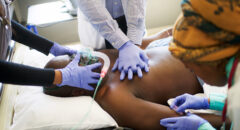
There seems to be no stopping Grammy Award-winning singer Toni Braxton -- not even her health. The R&B crooner performed with a heart monitor visibly strapped to her chest during a show in Georgia on Saturday — less than two weeks after she was hospitalized for the second time in several weeks due to the disease, lupus.
Doctors recommended Braxton, 49, wear the device at all times to identify pain in her chest, in addition to potential heart attacks or strokes, TMZ reports.
When she took the stage in Savannah, the monitor was in plain sight. TMZ got their hands on a picture of the device when she took the stage wearing a black jacket that was unzipped to expose her upper chest.
The last time Toni was in the hospital, Toni has been released from the hospital after being admitted for complications stemming from lupus.
“Hey guys, thanks for all your well wishes and understanding,” Braxton, 49, tweeted Sunday. “I am out of the hospital, and en route to Chicago..."
“Lupus needs to be constantly monitored and this minor setback should not affect the rest of her tour,” her Twitter account read after the news broke.
In early October, the singer Toni Braxton was taken to a Los Angeles hospital due to complications from lupus but is now doing better and recovering nicely, according to her representatives.
"Toni is resting at home and she is fine. She was in an L.A. hospital for a few days being treated for her lupus," her reps said in a statement to ABC News.
"She has been released and starts rehearsals for her upcoming tour this week. She was not in serious condition, though lupus is a serious disease and must be monitored at all times," Braxton's representatives added.
Lupus is a chronic, autoimmune disease, causing inflammation to a person’s internal organs, joints and skin. Lupus is not contagious and may be caused by a number of factors, including hormones, genetics and one’s environment, according to the Lupus Foundation of America. An exact cause for the disease is still unknown.

In 2008, Toni collapsed while performing in Las Vegas. In the emergency room, doctors first thought she’d had a ‘baby heart attack.’ “Twenty-three percent of my microvalves and the small blood vessels in my heart were receiving no oxygen,” Toni recalls. Further testing led to a diagnosis. “The blood work was undeniable,” she says. “It showed I have lupus.”
MUST SEE: Black Celebrities Who Suffer With Lupus
Toni discovered lupus is a lifelong disease in which the immune system attacks healthy tissue. It affects about 1.5 million Americans, mostly women, and causes a range of symptoms, from rashes and joint pain to inflammation of the heart, lungs and other organs. “For some, it’s their skin and scalp,” Toni notes. “For me, it’s internal. It loves my heart. It’s like it wants to sit there and say, ‘Hi,’ and hang out.”
While there's no cure for the disease, lupus symptoms can be managed using a number of different treatment options.
A person's treatment plan will depend on the severity of your condition and whether you've recently been experiencing flares (times when symptoms are present).
Flares can range from mild to severe.
The goal of treatment is to prevent flares, treat flares when they occur, and limit organ damage and other potential complications.
Medications for Lupus
Medications commonly used to treat lupus include the following:
Non-steroidal anti-inflammatory drugs (NSAIDs): These medicines can help treat pain, swelling, and fever associated with lupus.
Common over-the-counter NSAIDs include Advil (ibuprofen) and Aleve (naproxen). Stronger NSAIDs are available with a prescription.
Antimalarial medicines: Drugs typically used to treat malaria may help control lupus symptoms such as fatigue, joint pain, rashes, and mouth sores.
Plaquenil (hydroxychloroquine) is a common antimalarial drug used to treat lupus.
Corticosteroids: These medicines can help control inflammation, but they may cause long-term side effects such as weight gain, thinning of bones, high blood pressure, diabetes, easy bruising, and infection.








